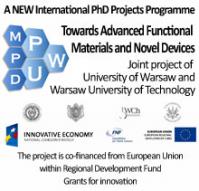Homepage » For Students »
Educational system
Flexible System of Three-Stage Studies at the Faculty of Chemistry of Warsaw University of Technology
In the academic year 1999/2000 the Faculty of Chemistry began the realization of a new curriculum called "Flexible System of Three-Stage Studies" which is a result of our long-standing experience in the field of chemical and chemical technology education. It is also a result of the participation of Warsaw University of Technology in international didactic programs concerning the transformation of studies at universities of technology in Poland, coordinated by the Commission for Education and Training of the European Commission.
A student starting studies at the Faculty of Chemistry may complete them after 3.5 years with a bachelor's degree (inżynier; 1st stage of studies), then after additional 1.5 years with a master's degree (magister inżynier; 2nd stage of studies), and after 4 more years with a PhD degree (Doctor of Chemical Sciences or Doctor of Technological Sciences; 3rd stage of studies).
For the first six semesters, all students undertake a common core curriculum course. The new system provides a possibility of an individual choice of courses depending on the interests and preferences of students and adapting the progress of studies to one's own abilities and financial possibilities. In planning and selection of a studying route, a student is assisted by a tutor. After 6th semester a student chooses a specialization and a didactic unit in which he/she would like to perform his/her diploma work.
The 3rd stage of studies is a continuation of the 2nd stage and their principles are described by the "Rules and Regulations of Doctoral Studies".
Credits corresponding to the European Credit Transfer System (ECTS) are a measure of the progress of studies of a student during the 1st and 2nd stage of studies, besides the traditional marks. The credits are obtained by crediting consecutive courses. The number of credits achieved is decisive for the semester and year for which the student is enrolled. A student having an appropriate number of credits may be enrolled for a higher semester than it results from the suggested curriculum. The most gifted students have a possibility to earlier complete their master's course ('skipping' a semester or year) and thus earlier start the doctoral studies.
One of the most important points of the new curriculum is the division of the conducted courses into basic and elective ones. Specialization courses have been distinguished from among the basic courses, which besides the compulsory basic version are also conducted as supplementary advanced ones. The crediting of all the compulsory courses and a certain number of supplementary as well as elective courses is a condition for transferring to higher semeters. The selection of the courses, conditioned, however, on some rules, is really of free choice. Students have a wide range of lectures, seminaries and laboratories to choose from the kind and range of knowledge achieved, both during the basic stage as well as further specialization selected.
In order to be enrolled for the master's course, student must credit at least 210 ECTS points. The curriculum of the master's course comprises more specialisation courses (one of three to choose from), but also general economic and production process courses.


